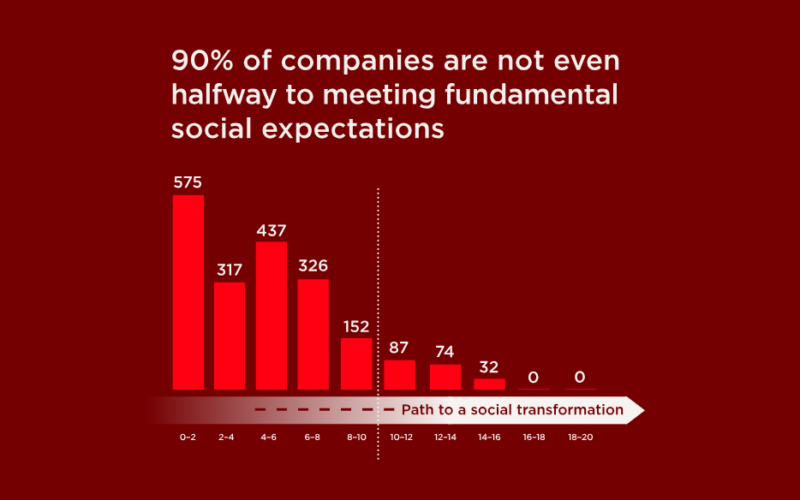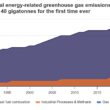Amid a cost-of-living crisis and widespread systemic inequalities, the World Benchmarking Alliance (WBA) 2024 Social Benchmark reveals that the 2,000 most influential companies are falling short of meeting societal expectations for creating a more equitable and inclusive world.
The WBA Social Benchmark measures company performance against key expectations for driving systemic change. These include upholding human rights, providing decent work with a living wage, and acting ethically by paying fair taxes and engaging in responsible lobbying. WBA assessed 2,000 leading companies across 19 industries, which collectively generate 45% of global GDP and employ 95 million people, influencing hundreds of millions more through their value chains. Despite their capacity and responsibility to lead, the findings are alarming—90% of these companies are not even halfway to meeting basic societal standards for human rights, decent work, and ethical practices.
Among the top 10% of companies that exceed the halfway mark, there is a clear commitment to respecting human rights, emphasising the importance of recognising the impact on people for socially responsible business practices. However, only 9% of these companies provide examples of how they engage with stakeholders affected by their operations. Companies that do involve affected stakeholders tend to perform better across all benchmark indicators, particularly in their commitments to human rights and the implementation of human rights due diligence. Those who actively consult with stakeholders are more likely to provide decent work, including prioritising worker health and safety and advancing gender equality and women’s empowerment.
Understanding the risks faced by affected stakeholders is crucial for companies to translate their human rights responsibilities into action. However, 80% of companies fail at the initial steps of human rights due diligence, such as identifying and addressing risks. Companies in countries with strong human rights regulations score nearly 60% higher, and those in high-impact sectors over 80% higher.
Most companies also fall short on decent work standards, particularly regarding living wages and working hours. Only 4% of companies pay their employees a living wage, and less than 1% have set targets to do so. Just 3% meet the International Labour Organization’s standards for working hours. By committing to living wages, companies can help reduce economic inequality and lift millions out of poverty.
Moreover, the 2,000 most influential companies, which account for nearly half of global GDP, show little transparency in political engagement. Only 11% have public policies on lobbying, and just 5% disclose their lobbying expenditures, leading to potential misalignment with their commitments to human rights and responsible business conduct.
The Social Benchmark also highlights sectoral and regional trends among the 2,000 companies assessed. Consumer-facing sectors, like apparel, footwear, ICT, and retail, generally perform better due to higher public scrutiny, particularly from consumers concerned about human rights abuses in supply chains. Regionally, top-performing companies come from various parts of the world, excluding Central Asia. However, performance varies, with Pacific-based companies averaging 35%, while those in the Middle East and North Africa average just 11%. Companies in the EU and OECD outperform the benchmark average, while G20-based companies score slightly below it. Addressing systemic social challenges requires multi-regional and global collaboration, facilitated by intergovernmental forums where diverse stakeholders can drive progress.
Overall, the Social Benchmark reveals a significant gap between current corporate practices and societal expectations for building a fairer and more inclusive world. While a few companies demonstrate good practices, the majority fall short. Without substantial corporate improvements, achieving the Sustainable Development Goals will remain difficult.






















